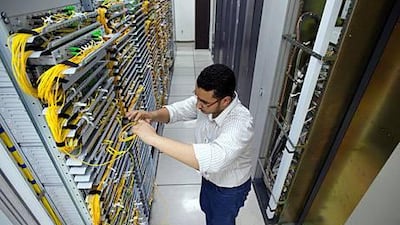Consumers countrywide should soon be able to choose their preferred internet and television provider as Etisalat and du begin testing their shared networks ahead of a national rollout later this year.
Last year, both of the country's telecommunications operators finalised discussions to gain access to each other's broadband internet and television networks in a move that is designed to break their monopolies within their respective territories.
Etisalat has a monopoly on providing internet and cable television services in most of the country, while du holds sway over a small area of Dubai that includes newer neighbourhoods such as Dubai Marina, Palm Jumeirah and Media City.
More than 1.46 million subscribers in the UAE had signed up to fixed-line or broadband mobile internet and landline phone services by October, the most recent month for which figures are available, according to the Telecommunications Regulatory Authority (TRA).
Analysts said the introduction of the choice of du or Etisalat across the UAE would drive prices for telecoms services down as competition would force the operators to offer promotions to retain business and attract new customers.
Khalifa al Shamsi, the senior vice president of marketing at Etisalat, said the operator had started home-testing the service to ensure its network can be accessed in du's territory.
"The only thing that is happening right now is test users within the companies themselves are doing the testing as far as verification," Mr al Shamsi said.
He did not say, however, when the TRA would approve the move to make the two networks available throughout the UAE. He added that there were no plans for Etisalat to sign up potential customers in du's territory at the moment.
"There has been no announcement about broadband coming to [those] areas yet," Mr al Shamsi said. "The minute we are comfortable with the progress, we will announce the firm date for it."
Farid Faraidooni, the chief commercial officer for du, said the company had started its own internal testing for the technology that would make network convergence possible.
"We're doing technical testing, that's correct, but we have not put any of our employees on any of these services yet," Mr Faraidooni said.
He said du engineers were currently testing components to ensure services were not disrupted during the changeover.
"At the end of the day, these are different components that work together - from systems to networks to all different things," Mr Faraidooni said.
Last month, Mohamed al Ghanim, the director general of the TRA, said there were some delays in fine-tuning the main technology that would support the Etisalat and du networks but declined to elaborate.
That technology is called "bitstream" and is installed on software and hardware packages to identify when a subscriber of one operator is using a telecoms service provided by another.
Mr al Ghanim said the TRA should finally approve the launch of the services after pilot programmes had been carried out with customers across the UAE. Those were scheduled to begin in the first quarter of this year.
It is widely expected that du, the smaller of the two UAE operators, will be the prime beneficiary of a scheme that would give local consumers the ability to choose their internet and television provider.
Irfan Ellam, a telecoms analyst at Al Mal Capital, said recently that both operators would be able to bundle their offerings into a post-paid "quadplay" package where customers could subscribe to television, fixed-line, internet and mobile services at a discounted rate.
Using such post-paid packages, operators are able to generate higher revenues than with prepaid or individual offerings, Mr Ellam said.

